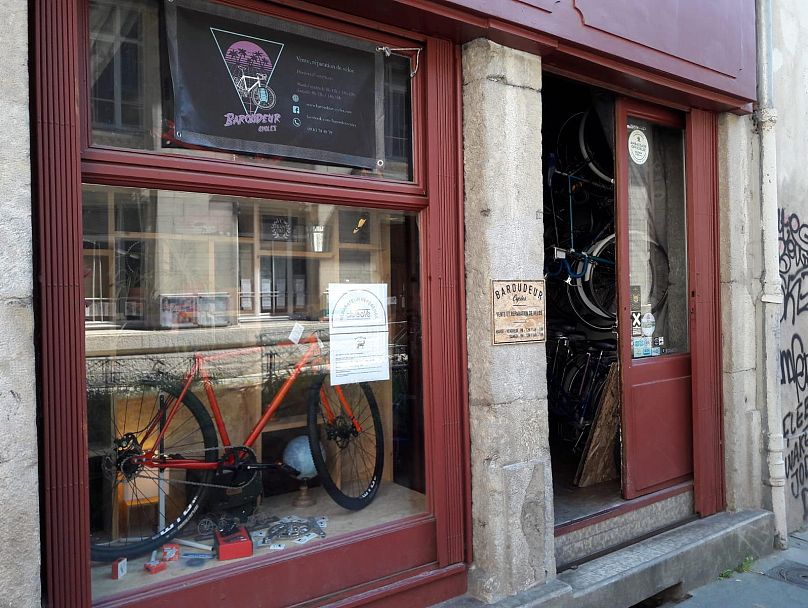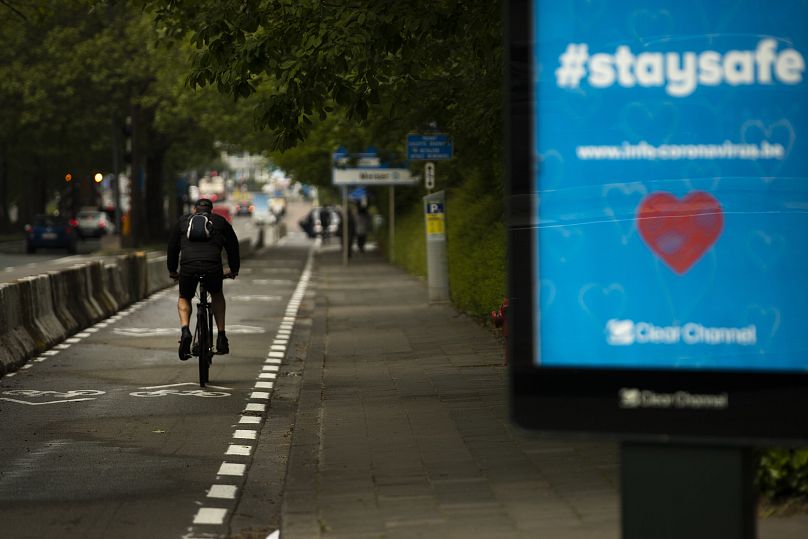Bike sales are booming and European cities are making more space for cycling. But, will it last?
As lockdown restrictions are lifted, Europeans are turning to bicycles in an effort to avoid crowded public transport during the coronavirus pandemic.
 ADVERTISEMENT
ADVERTISEMENT
 ADVERTISEMENT
ADVERTISEMENT
They are flocking to bike shops as cities across the continent free up space for a greener form of travel.
The French government, for instance, is providing €50 for people to fix their bikes in an effort to promote cycling over public transportation.
It’s fuelled a bike repairing craze, with stores unable to match the demand.
“Normally we have a 48-hour delay for any bicycle repair," said Tanguy Julien-Lafferière, one of the owners of Baroudeur Cycles in Lyon. "But now it’s a delay of a month and a half. We’re now repairing 15 bicycles per day, seven days a week for the next month and a half."
The store's bike sales have increased as well. Before COVID-19, Julien-Lafferière's shop sold around five bicycles a week. Now it’s roughly 15 a week, he says.
“People don’t want to take public transport and they’re realising that it’s completely feasible in Lyon to bike,” Julien-Lafferière said. "It's even more enjoyable."
Many cities across Europe are working to encourage cycling in an effort to avoid increased traffic on roads as people avoid crowded metros and buses.
“Given the desire to have physical activity after eight weeks of lockdown and given the provisional bike system in place, I am positive that the bike will come out as a big winner,” said Olivier Schneider, the president of the French Federation of Bike Users, who worked together with the government on the money for bicycle repairs.
In Paris, Mayor Anne Hidalgo said the city will add 50 kilometres of bike lanes by the summer, most of which will follow the busiest metro routes. There are already 1,000 kilometres of cycling lanes in the French capital.
Schneider said there are more people interested in cycling than they could have imagined, given "the empty shelves of bicycle shops and the order books full of bicycle repairs".
London promotes cycling as part of post-lockdown transport plan
Shops in London have seen the same increase in sales and repairs.
Brick Lane Bikes has nearly sold out of bicycles due to an increase in demand.
“We have two to three people a day buying their first bike,” said Ted, the shop manager at Brick Lane Bikes.
He says the store is now taking pre-orders, something that they had never done previously.
“There was a slight drop [in bike sales] in the first two weeks of lockdown but, ever since then, it’s been crazy [because] no one wants to take public transport,” he added.
London's post-lockdown transportation plans include creating temporary cycling lanes and reducing car speed limits near the lanes.
The city is adding 30 kilometres of permanent cycling lanes to the 160 kilometres of existing lanes.
“This is a rare moment where government under Boris Johnson and London under Sadiq are aligned – the government has been clear on the need for radical shifts of road space use away from cars and towards cycling in London and across England,” Simon Munk, the infrastructure campaigner from the London Cycling Campaign told Euronews.
He says they now need to accelerate the "pace of progress" which includes reviewing road danger policies.
Cycling isn't just popular as people try to avoid public transportation, Munk said, but also because "low motor traffic volumes have enabled families and many others to cycle without fear for once".
A visible difference on roads in Brussels, cyclists say
There is a visible increase in bike use on the streets of Brussels, says Jean-Philippe Beckers, who runs bicycle repair workshops in the EU capital.
Beckers said you now have to “really pay attention” when reaching an intersection because there are more cyclists on the road.
Even though Belgium has not fully exited lockdown, Beckers, who works for Les Ateliers de la Rue Voot, said they have already seen an uptick in repair workshops - with between 10 to 15 repairs per afternoon.
People have been bringing in older bicycles from their garages to be repaired, he said.
Some bike-share programmes are also reporting more users.
Villo! in Brussels has seen a 15% increase in usage compared with before lockdown despite recording a sharp decrease during strict coronavirus restrictions of around 50%.
Paris' bike-share programme Vélib, meanwhile, has recorded longer average distances per bike trip.
In Lyon, the bike-share program Vélo'v, which saw a usage decrease of 85% during lockdown, is now nearly back to the same number of users it had before March.
But despite the bike frenzy that has taken over some European cities, there is concern that the easing of lockdown will bring many more cars to already busy city roads.
Deaths due to traffic accidents fell by 50% in France during the month of April, but as many people went back to work on May 11, it remains to be seen whether or not there has been an increase in traffic this past month.
The UK's Department for Transport says it is encouraging walking and cycling in an effort to "reduce pressure on the public transport system and the road network".
“There is a real risk now as London starts easing its lockdown, that the cars won’t [just] come back, but will be worse than ever – with the resulting pollution, road danger and drop in cycling," said Munk at the London Cycling Campaign.
"If only a few per cent of those who previously used our tubes and buses drive, London will be at a standstill."
**What do you think? Have you taken up cycling post lockdown? Is Europe doing enough to encourage pedal power? Let us know in the comments, below. **












